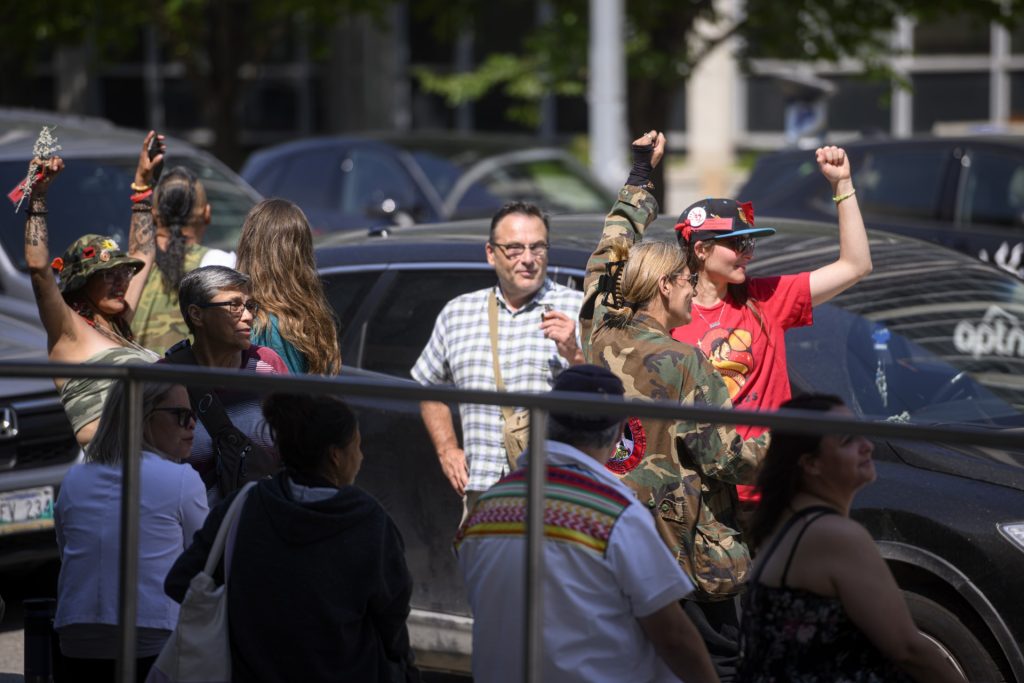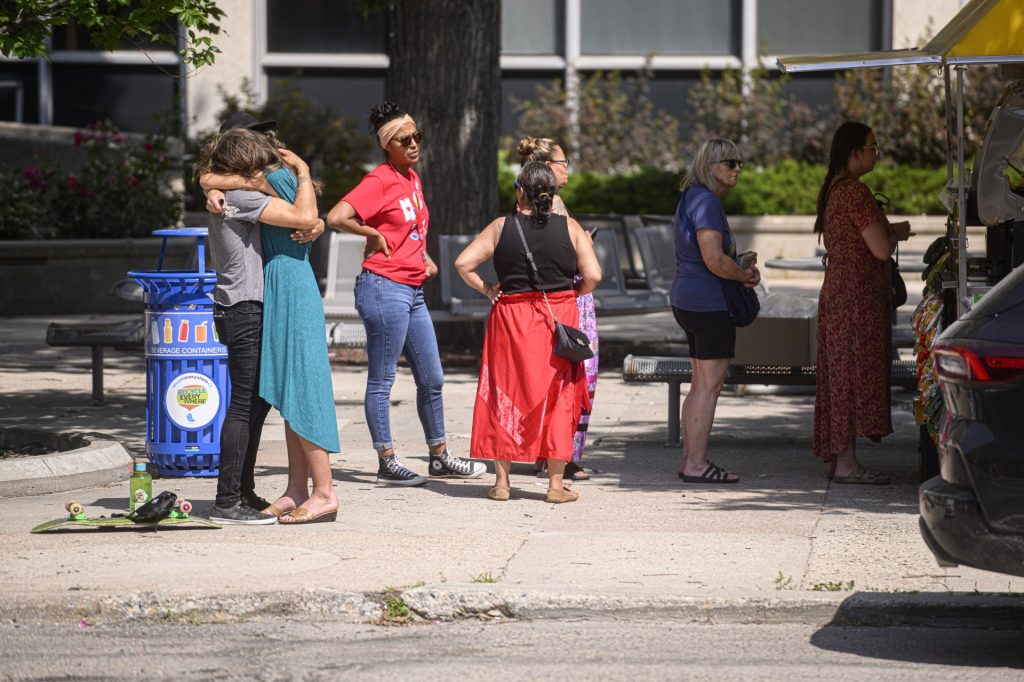Admitted serial killer found guilty of first-degree murder in deaths of four women in Winnipeg

Posted July 11, 2024 12:14 pm.
Last Updated July 12, 2024 11:22 am.
Admitted serial killer Jeremy Skibicki has been found guilty of first-degree murder in the deaths of Morgan Harris, Marcedes Myran, Rebecca Contois, and an unidentified woman known as Buffalo Woman.
#BREAKING: Admitted serial killer Jeremy Skibicki has been found guilty of first degree murder in the deaths of Morgan Harris, Marcedes Myran, Rebecca Contois and an unidentified woman known as Buffalo Woman.
— Edward Djan (@EdwardDjan1) July 11, 2024
At issue at the trial was whether or not Skibicki should be found not criminally responsible (NCR) due to a mental disorder after he admitted to killing the four Indigenous women.
His defence tried using the NCR defence arguing he had schizophrenia while the crown disputed that saying Skibicki did not have any major mental illness and that his killings were motivated by Skibicki being a racist homicidal necrophiliac who intentionally planned out the deaths.
But Crown prosecutors said he had the mental capacity and awareness to commit and cover up the killings.
When delivering his oral judgement Justice Glenn Joyal said that he did not believe Skibicki did suffer from a mental illness such as schizophrenia at the time of the killings. He sided with the crown’s psychiatrist Dr. Gary Chaimowitz regarding Skibicki fabricating details of a mental illness.
He said the “shocking and unsettling” case is emblematic of the issue of missing and murdered Indigenous women and girls in Canada.
After Joyal delivered his judgement, people in the packed public gallery erupted in cheers, while Skibicki appeared to have a stoic look on his face following the verdict. Sentencing will happen at a later time to allow for victim impact statements.

Jorden Myran, a sister of one of Skibicki’s victims, Marcedes Myran, said she held back tears when the judge delivered the decision.
“I feel like a weight has been lifted off my shoulders,” she said outside court. “Justice was served today.”
A first-degree murder verdict carries an automatic life sentence with no chance of parole for 25 years.

Jeremy Contois, a brother of victim Rebecca Contois, said he was filled with mixed emotions after the verdict.
“We hope that it brings closure. It’s been a difficult two years.”
The weeks-long trial heard Skibicki targeted the Indigenous women at homeless shelters, strangled or drowned them and disposed of their remains in garbage bins.
The killings came to light in May 2022 when a man looking for scrap metal found the partial remains of Rebecca Contois in a dumpster in Skibicki’s neighbourhood. More of her remains were discovered at a city-run landfill the following month.
During a police interrogation, Skibicki admitted to killing Contois and the three other women. He said the killings were racially motivated and cited white supremacist beliefs.
Court heard disturbing details about the killings of the women: Morgan Harris, 39; Marcedes Myran, 26; Rebecca Contois, 24; and an unidentified woman an Indigenous grassroots community has named Mashkode Bizhiki’ikwe, or Buffalo Woman.
Contois was from O-Chi-Chak-Ko-Sipi First Nation, and Harris and Myran were from Long Plain First Nation. All three were living in Winnipeg when they were killed.
The only evidence police have pointing to the identity of Buffalo Woman is DNA found on the cuff of a woman’s jacket.
Dr. Sohom Das, who testified for the defence, said Skibicki felt compelled to kill the women because he was on a mission from God and heard auditory hallucinations coaxing him to kill.
Das said Skibicki knew at the time the killings were legally wrong but lacked the capacity to know they were morally wrong.
Court heard Skibicki has a history of mental illness, including depression, borderline personality disorder and thoughts of suicide. But he was not previously diagnosed with schizophrenia.
Dr. Gary Chaimowitz, who testified for the Crown, said Skibicki likely has anti-social and substance abuse disorders but did not have an active major mental health disorder at the time of the slayings.
Chaimowitz said he believes Skibicki was driven to kill because of his sexual interest in the dead. Court heard he committed sex acts on their bodies before disposing of their remains.

The killings came to light in May 2022 when a man looking for scrap metal found the partial remains of Contois in a dumpster in Skibicki’s neighbourhood. More of her remains were discovered at a city-run landfill the following month.
During a police interrogation, Skibicki admitted to killing Contois and the three other women. He said the killings were racially motivated and cited white supremacist beliefs.
Buffalo Woman was killed in March of that year, while Harris and Myran were killed in May.
The Crown has said it doesn’t believe there are additional victims.
In 2022, police said they believed the remains of Harris and Myran were taken to another landfill outside the city but a search of that site would be too complex and dangerous.
There were countrywide protests demanding a search of the Prairie Green landfill. The federal and Manitoba governments recently committed a combined $40 million for a search, which is expected to start in the fall.
Reactions to verdict
Manitoba’s premier Wab Kinew issued a statement following Thursday’s verdict, saying it marked a “significant day in the history of Manitoba.”
“It is important that there is accountability for what are some of the worst crimes in our province’s history. I thank Chief Justice Glenn Joyal for showing respect to the victims, their families and the context of MMIWG2S+ in which the verdict was delivered,” said Kinew.
He went on to explain the verdict was a relief for many and it “meets our expectations on how any of us as Manitobans would want our families to be treated if we were thrown into such a terrible situation.”
Kinew said he spoke to the families of Marcedes Myran, Morgan Harris and Rebecca Contois following the verdict to offer them support and to hear their reactions to the verdict.
“I also lift up Mashkode-Bizhiki’ikwe, the victim in this case whose identity we do not yet know. These fellow Manitobans have been put through a profound loss, a disturbing trial and much more. Through it all, they have reminded our society that every person is alike in value, that we ought not to leave anyone behind and that we must always pursue justice,” said Kinew.
“Our collective action must now turn to preventing crimes like this from happening again in the future, lifting up the most vulnerable in our society and searching the Prairie Green Landfill to advance the healing journey of these families.”

Kinew wasn’t the only one to react to the verdict. The Southern Chiefs’ Organization (SCO), also issued a statement saying they are thankful Skibicki was found guilty.
“Today there are many mixed emotions as our citizens continue to grapple with this horrific reality of having lost their loved ones in such a violent and tragic way. We hope this verdict helps the families and loved ones of the victims as they continue to grieve these immeasurable losses,” said SCO Grand Chief Jerry Daniels.
The SCO would go on to explain that while the verdict is a crucial milestone, there’s still a lot of work that needs to be done to address systemic failures that contribute to disproportionate violence against Canada’s Indigenous people.
“The Southern Chiefs’ Organization will continue to help ensure the voices of the families and Survivors are heard and that justice is pursued with dedication and determination,“ said Grand Chief Daniels.
“The lives of our First Nations members matter.”
“SCO supports the resolution from the Assembly of First Nations calling on Manitoba to hold an independent inquiry into the killings of the four women. As we move forward, we must all work together to create a safe society for our women, girls, two-spirit, and gender-diverse people,” the Grand Chief explained.
“Although we are pleased to hear this serial killer has been found guilty of first-degree murder, our work in combatting violence against First Nations people in Manitoba is not over.”
The Assembly of Manitoba Chiefs (AMC) also issued a statement saying they stand in solidarity and support of the families of Rebecca Contois, Morgan Harris, Marcedes Myran, and Mashkode Bizhiki’ikwe.
“Today’s verdict marks an important step towards justice for Rebecca Contois, Morgan Harris, Marcedes Myran, and Mashkode Bizhiki’ikwe (Buffalo Woman),” shared AMC Deputy Grand Chief Betsy Kennedy.
“While we recognize that no verdict can fully heal the pain experienced by their families, we hope that it serves as a foundation for their healing journey. This outcome reinforces the necessity for systemic changes to address the ongoing violence against First Nations women, girls, and Two-Spirited individuals. We remain committed to advocating for the rights and protection of our people and to ensuring that justice is served for all.”
The AMC echoed the SCO statement regarding systemic challenges, adding there needs to be fair distribution of resources and easily accessible support services, enabling individuals to access healing and support programs without barriers.
“Today is monumental, a turning point in what has been a very long journey. The verdict delivers justice, but our mission remains unfinished until we bring Morgan, Marcedes, and Mashkode Bizhiki’ikwe home,” said Melissa Robinson, cousin of Morgan Harris in a statement.
“After enduring such a long fight, we are happy to have moved on from ‘We NEED to bring them home’ to a determined promise of ‘We WILL bring them home.’ Today, we take a decisive step forward with the conviction and assurance that ‘We ARE bringing them home.”
The AMC adds it “remains resolute in its commitment to tackling these issues head-on, advocating for systemic reforms and concrete measures aimed at protecting the rights and well-being of First Nations women, girls, and Two-Spirited persons.”
The federal government has a support line for those affected by the issue of missing and murdered Indigenous women and girls: 1-844-413-6649. The Hope for Wellness Helpline, with support in Cree, Ojibway and Inuktitut, is also available to all Indigenous people in Canada: 1-855-242-3310.
-With files from The Canadian Press








